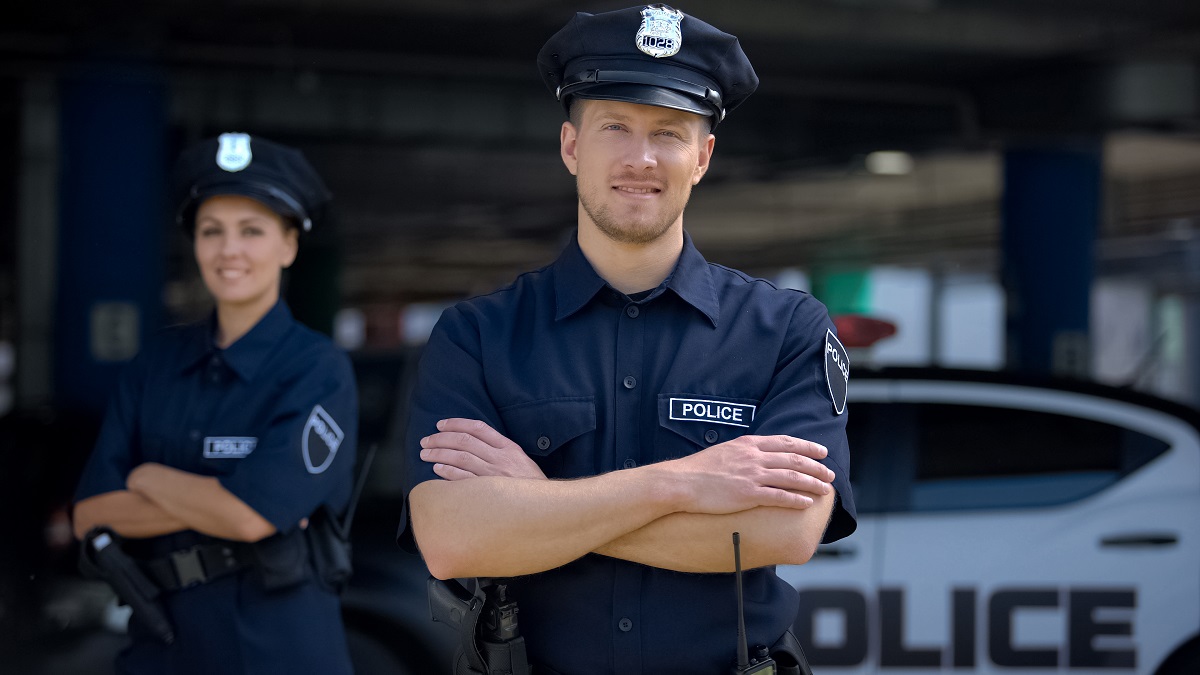Do you Need a College Degree to be a Police Officer?
The global imaginary of the cop is a bit distorted. You might think of movie scenes with crazy chases, shootouts, and explosions. And while that does happen, it’s not the day-to-day for most cops.
The reality is that being a cop requires split-second decision making, an ability to handle high-pressure situations, and excellent communication skills. The latter is particularly important, because you’ll find yourself in situations where you have to calm people down who are upset, frightened, or angry.
Cops are public servants. And like any public servant, they are held to a higher standard. They are expected to have more education than the general population and be able to pass a series of tests that show they can perform their duties. But does that mean they need a college degree?
The simple answer is no, you do not need a college degree to become a cop. There are many ways to enter the police academy and begin your career in law enforcement.
However, some states require police officers to have a college degree, or at the very least a certain number of college credits.. And some departments may prefer to hire candidates with a degree. Plus, having a degree may give you an edge over other candidates.
So, while you can become a cop without a college degree, it may not be as easy as it once was. And, in some cases, it may not be possible at all.
Keep in mind that while you may not need a degree to become a cop, many departments require officers to have a college degree if they want to be promoted to sergeant or above. So, if you are looking to move up in your career, you will eventually need a degree.
In this article, we are going to see how to become a cop, and how a college degree can benefit you in your career.
Do you Need a College Degree to be a Police Officer (How)?
The first step to becoming a police officer is to research the requirements of the departments you are interested in.
Most agencies have similar requirements, but there can be some differences. For example, some agencies may require you to have a certain amount of college credits, while others may not.
But what if you don’t have a college degree and you still want to become a cop?
The good news is that there are many ways to enter the police academy and begin your career in law enforcement. You can start by taking some college courses, or you can look into other training programs offered by your local police department.
No matter what route you take, remember that becoming a cop is a demanding job that requires dedication and hard work. But if you are up for the challenge, it can be a rewarding career.
Usually, to become a cop, you have to follow a specific path. Let’s see it.
Get the Minimum Schooling Requirements
Usually, this means either your high school diploma or GED. Some states, like Illinois, also require you to have a certain number of college credits.
Each state has its own specific requirements you can find on their respective police forces’ website. For example, here is New York’s, and here is Maine’s.
Editor’s note: An important factor to consider is age. Some states accept anyone aged 18 or older, but some, like California, only accept people aged 21 or older.
Apply to the Police Academy
The next step is to apply to the police academy. You will need to pass a written exam, physical fitness test, and background check.
The written exam is usually multiple-choice and tests your knowledge of the law, constitutional rights, traffic laws, and more.
The physical fitness test is just that – a test of your physical fitness. You will need to be able to run, jump, crawl, and more.
The background check is to make sure you have not been involved in any illegal activity and that you are of good character.
Once you have passed these tests, you will be accepted into the police academy.
Complete the Police Academy
If you are accepted into the academy, you will undergo intense training. The police academy is a strenuous program that will test your mind and body. You will learn about the law, physical fitness, self-defense, and more.
You will also have to pass a final exam before you can graduate from the academy.
Once you have graduated, you will be a sworn police officer and will be ready to begin your career in law enforcement.
No matter what route you take, remember that becoming a cop is a demanding job that requires dedication and hard work. But if you are up for the challenge, it can be a rewarding career.
Work Hard and Accelerate Your Career
As a police officer, you will be expected to work long hours. You may be required to work nights, weekends, and holidays.
You will also be on call – meaning you may have to drop everything and go into work at a moment’s notice.
But if you are dedicated to your job, you can rise through the ranks and have a successful career in law enforcement.
Editor’s note: If you don’t have a college degree, don’t worry – there are still many ways to enter the field of law enforcement and have a successful career. Talk to your local police department about their requirements and training programs. And remember, dedication and hard work are key to success in any career.
Extra Opportunities with a College Degree
While a college degree is not required to become a police officer, it can give you an edge in the hiring process and help you advance your career.
With a degree, you will have the opportunity to take on more responsibility and leadership roles. You will also be able to command a higher salary. So, if you are looking to move up in your career, a college degree may be the way to go.
For example, let’s say you got a degree in criminal justice. You would then be qualified for positions such as detective, crime scene investigator, and more. These positions would most likely be impossible to obtain for someone without a degree — unless they demonstrated exceptional skills in the field.
The same goes for a degree like Forensics or Psychology. Both of those would put you ahead of your peers with just a high-school diploma.
So, if you are considering a career in law enforcement, remember that a college degree can give you an advantage. But it is not required to enter the field or have a successful career.
States Where You Need a College Degree or College Credits to Become a Cop
Now, the most dreaded part. Some states require that you have a college degree or certain number of college credits to even be considered for the police academy.
For example, in Pennsylvania, you need 60 college credits from an accredited institution. In New Jersey, you must have an Associate’s Degree in Police Science, Criminal Justice, or a related field.
California just passed a bill this January that raised the minimum age to become a cop from 18 to 21, and it’s asking local colleges to create ‘modern policy’ degree programs by 2025.
Expect to see similar programs to pop up all around the States. It’s becoming more and more necessary for a cop to be more educated, following the general population trend.
So, if you live in one of these states and don’t have a college degree, you may need to consider getting one before you can even start the process of becoming a police officer.
But again, this is not the case in every state. Many states, such as South Dakota and Colorado, do not have any education requirements to become a police officer.
So, if you are interested in becoming a cop, research the requirements in your state. And if you don’t have a college degree, don’t let that stop you from pursuing your dream of becoming a police officer.
Furthering Your Education as a Cop
Many states have bonuses and incentives for cops to further their education. These come either as tuition reimbursement, salary bonuses, or both.
For example, states like Arizona and Montana offer tuition reimbursements to cops who want to earn a college degree. In some cases, the state will even pay for your entire tuition.
Editor’s note: Some states don’t put limitations on what you can study, while others will reimburse your tuition only if you’re taking courses related to the law enforcement field.
Other states like Connecticut and Illinois offer salary bonuses to cops who have a college degree. So, if you are already working as a police officer and want to go back to school, check with your department to see what incentives they offer.
You may be surprised to find that many departments are willing to help you pay for your education.
The Daily Life of a Cop
Before enrolling into a police academy, it’s important to understand what you’ll be doing most days. If you thought you’d live a real-life action move, think again.
The reality is that most of your days will be pretty routine. You’ll be responding to calls, writing reports, and conducting investigations.
But there will also be the occasional high-stress situation. You may have to chase a suspect or deal with a violent individual.
So, if you are looking for continued excitement, a career in law enforcement may not be for you. But if you are looking for a stable career with the opportunity to help people, then a career in law enforcement may be perfect for you.
What matters is that you keep your empathy and humanity with you at all times.
What Skills Does a Cop Truly Need?
So, we’ve established that a college degree can give you an advantage when becoming a cop or advancing your career. But what skills does a cop actually need?
Contrary to popular belief, you don’t need to be able to bench press 200 pounds or run a four-minute mile. In fact, many departments have fitness tests that are much more realistic for the average person.
You don’t need to be a martial arts expert or have perfect aim, either. Most police departments require you to pass a firearms training course, which will teach you everything you need to know about using a gun.
What you do need is the ability to communicate effectively and handle stress. You need to be able to think quickly and make split-second decisions. You need to be physically and mentally tough.
This is crucial for any good police officer. Think about it, how many people trying to suicide have been dissuaded with the right words? If you can stop someone from doing such an extreme gesture, you can help them through whatever is causing them so much pain.
And, college degrees help with this too. Exams are a perfect example of this. They test your ability to handle stress and think quickly under pressure. So, if you can do well in college, you have a good chance of being a successful cop.
The ability to empathize with people and see both sides of every issue is also important. After all, not everyone who breaks the law is a bad person. Sometimes, people make mistakes. And as a police officer, it’s your job to help them get back on the right track. To be a cop is to be human.
You also need to have a clean criminal record and a strong moral character. Many departments require you to pass a background check and a polygraph test (a test that measures your stress levels while answering questions).
Conclusions
So, do you need a college degree to become a cop? The answer is – it depends.
If you want to have an advantage when applying for a job with a police department, then a degree can give you the edge you need. And if you are already working as a police officer, many departments are willing to help you pay for your education.
In the end, what matters most is that you have the ability to communicate effectively, handle stress, and think quickly. You also need to be physically and mentally tough. And it helps if you have a clean criminal record and a strong moral character.
You need to enter the police force with a mindset of helping others. You are there to protect and serve. And if you can keep that in mind, you will be a great asset to any department.
Also Read:







